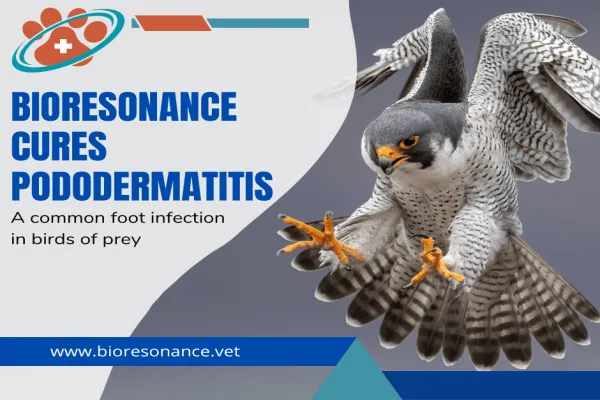
BICOM® Therapy for falcon with bumblefoot
Custom HTML/CSS/JAVASCRIPT
Client Name: Evelyn Brey Dubai
Falcon breeder impressed
I have been living in Dubai for 22 years and work as a BICOM® therapist. One day a sheikh who bred falcons asked if I could help him as two of his Saker falcons were suffering from bumblefoot (ulcers on the ball of the foot, pododermatitis).
The two birds could no longer be used for hunting. The ulcers on their feet were so large that they could no longer stand properly. They were off their food and were probably also in pain. All in all, they were so weak that they were no longer able to fly, let alone hunt.
The owner had already lost several birds to bumblefoot. Since conventional medical methods (antibiotics, ointments, etc.) had not helped, he came to me although he was highly skeptical of this method of treatment. He was even so wary initially that he only allowed me to treat one falcon. Only when he saw that this animal was quickly recovering, – its condition improved just a few days after the first BICOM® treatment and the wound began to close – was I permitted to look at the second bird. This one had additional respiratory problems.
I treated the first bird twice and the second three times at weekly intervals.
I used discharge from the ulcer for the treatment, feeding its information into the BICOM® device and modulating it with pre-installed programs to create therapy frequency patterns.
Treatment was straightforward and progressed without a hitch. The breeder was very impressed and astonished that everything went so smoothly, causing the birds no stress, and that the symptoms had disappeared after just three weeks.
He was so convinced by this successful outcome brought about by the bioresonance method that he immediately recommended me to other falcon breeders.
Search Testimonials
It is important to remember that individual anecdotes and testimonials should not be used as the sole basis for making decisions about medical treatments or therapies.
When it comes to alternative therapies like bioresonance, it is essential to rely on evidence-based research and the advice of trained medical professionals. While some people may have positive experiences with bioresonance for their animals, it is important to approach these claims with caution and seek out reliable information from reputable sources.
Ultimately, the decision to pursue bioresonance or any other alternative therapy for your animal should be made in consultation with a veterinarian or animal health professional who can help you weigh the potential benefits and risks.
Pollen – a nuisance for our animal companions too
Hay fever patients are only too familiar with the problem. Year after year the misery begins in the spring with stinging eyes, runny itchy nose and, in severe cases, with a cough and asthma as well. What is perhaps less well known is that our animals too suffer increasingly from this same medical condition.
Just as with humans, the incidence of allergies is also becoming more frequent in animals. Allergic reactions may be provoked by airborne allergens such as pollen, house dust and house dust mites, amongst other factors. Food intolerance is also on the increase, however, and represents a distressing problem for the affected animals.
Now, in spring, as it gets warmer, allergic animals are all suffering as well. With animals it is mainly their skin which itches or else their
noses run more and they occasionally sneeze. Changes in their coats and reddening of the skin are often noticed in the face, feet and ears. These areas often display bloody claw marks and develop into very painful weeping eczema, indicating the severity of the irritation.
This type of problem in animals can be treated with the allergy programs pre-loaded in the Bicom device.
Dr. med. vet. C. May
Quick Links


Facebook
Instagram
Mail